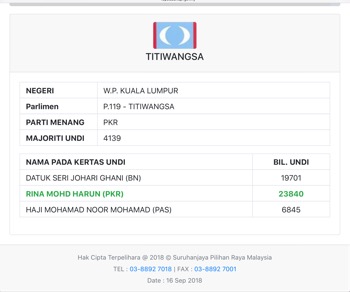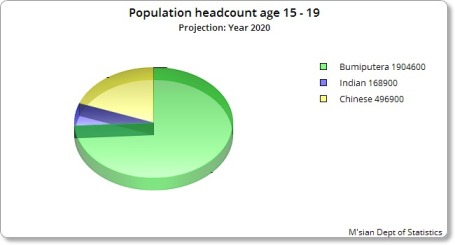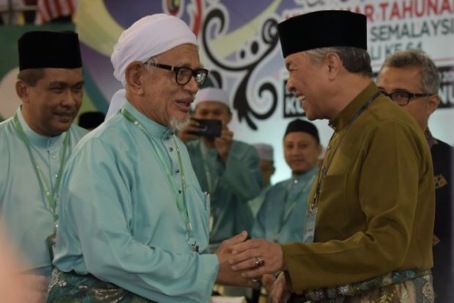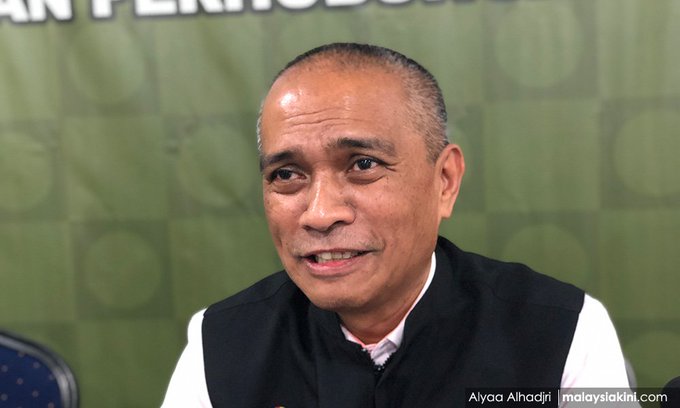Sumber : Helen Ang
DAP vociferously argues that the Malay opposition (Umno, PAS) cannot win elections unless they have multiracial support from the voting public. That's debatable.
When combined, the total votes for Umno and PAS exceed Harapan votes – for example – in the seat contested by Pribumi federal minister Rina Harun who holds the Rural Development cabinet portfolio.
Titiwangsa parliament result GE14:
- Pribumi: 23,840 votes
- Umno (19,701) + PAS (6,845) = 26,546 votes
Rina won 47.3 percent of the votes cast (50,386) in Titiwangsa, a parliament constituency in Kuala Lumpur. Rina's 47.3 percent is short of a popular majority.
Titiwangsa has 70.5 percent Malay voters, 17.3 percent Chinese and 9.4 percent Indian. There are many seats with the Titiwangsa profile as well as seats where Harapan won only very marginally ahead of the second-placed candidate in three-cornered fights.
Other Pribumi cabinet ministers and their GE14 parliament vote percentage:
- Maszlee Malik / Simpang Renggam: 50.7%
- Redzuan Yusof / Alor Gajah: 50.7%
- Syed Saddiq / Muar: 53.1%
- Muhyiddin Yassin / Pagoh: 55.2%
[Note: Alor Gajah and Simpang Renggam were contested by MCA and Gerakan respectively, and thus it cannot be assumed that these BN votes can be automatically transferred to Umno. Alor Gajah has 60.8 percent Malay voters and Simpang Renggam, 59.6 percent Malay voters.]
Pribumi's Redzuan and Maszlee barely passed the 50 percent mark in popular vote. It will not require too much to swing their seats.
The huge advantage for Umno-PAS is that the next generation of new voters comprises largely Malays, and the numbers gap with low birthrate young Chinese is wide.
BELOW: It's projected that in the year 2020, the Malaysian population will have 1.9 million Bumiputera aged 15-19. Chinese youths in the same age cohort will be a little under half million and Indians, 170,000. These 2.6 million youths are the potential first-time voters
Syed Saddiq won in a seat which has 31.5 percent Chinese voters, and Muhyiddin in a seat with 29.8 percent Chinese voters. Despite their areas having 'so many' Chinese or roughly three Chinese out of every 10 voters, the Pribumi popular vote in Muar (53.1%) and Pagoh (55.2%) is unconvincing, i.e. merely between three and five percent above the 50-majority line.
Umno-PAS are good for seats above 70-75 percent Malay voters and competitive in seats 60-70 percent Malay voters.
We must not forget either that Chinerse are over-registered to vote (in proportion to the community ratio in the general population) and also represent a very high turnout on polling day.
Mahathir himself did not enjoy a comfortable victory either. He had 18,954 votes in Langkawi. There Umno and PAS together had 15,573 votes, i.e. putting Pribumi ahead of Umno-PAS only by 3,381 votes in the parliament seat held by no less than the prime minister himself.
'PAS and Umno's blooming ta'awun siyasi relationship' — read HERE
Another high water mark in Malay unity
Never since the rebellion of 1946 have the Malays been this united. Yesterday Umno and PAS shook hands and called curtains on BN.
So it's Umno-PAS on one side, and DAP & Gang on the other. If GE15 is to be called in five years' time, Mahathir will be 98. Anything and everything can happen in the interim – all depending on an old man's state of health.
Mahathir's political adversary, however, is nowhere near as volatile. On the contrary, relationship between Umno and PAS will only get stronger with time. Umno-PAS are appealing to an overlapping Malay Muslim constituency. This complementary demographic factor allows both parties to strengthen each other.
BELOW: The ugly face of hateful DAP politics
Their message on joint vested interests – Malay rights, Muslim rights – mutually enhance their one cohesive, consolidated message. Such is not the case with DAP and Pribumi who have voter bases that are inherently hostile to the other.
The message that DAP and Pribumi send to their respective followers contradict the political intent of the other. For example, DAP supporters demand "equality". This demand neccesitates the negation of Article 153 of the federal constitution on the Malay special position. They also want "meritocracy", ergo no more NEP-like affirmative action programmes.
Chinese demands made through DAP such as equality, meritocracy, etc rile up the Malays who have objected to (one particular episode of) Guan Eng placing Mandarin above the national language, objected to acceptance of the UEC, objected to opening the doors of Mara colleges and UiTM to everybody, objected to diluting the authority of Islamic government agencies … the list of objections goes on and on.
Pribumi has had to recently convene a Bumiputera congress to allay Malay anxiety. The event pissed off Dapsters who have bought into DAP's New Malaysia promise of "Beyond Race".
Whatever DAP does to please Dapsters will upset the Protuns. Whatever Pribumi does to please the Protuns will upset Dapsters. This vital factor of mutual antagonism must not be underestimated for its role of corroding the toxic Harapan alliance.
Harapan are disparate parties with no shared ideology and pulling in four different directions of the compass. PAS and Umno are, on the other hand, almost interchangeable. The former emphasizes on Islam, the latter on Malays. Hence Islam Melayu … Melayu Islam … satu halatuju.
The combined PAS and Umno GE14 popular vote for the Seri Setia state seat in Selangor was 32.89 percent. In the recent Seri Setia by-election, PAS garnered 41.4 percent of the popular vote with help from Umno during the campaign. That's nearly a 10 percent improvement.
Malay support for Umno-PAS (as one entity) is more than the sum of its parts. But support for Harapan can only decrease as election promises go unfulfilled, expectations are unmet, when our currency weakens, inflation and unemployment rise, foreign investments dry up and the cost of living skyrockets.
Umno-PAS, growing closer and stronger by the day, have a chance of taking back Putrajaya sooner than you imagine.












